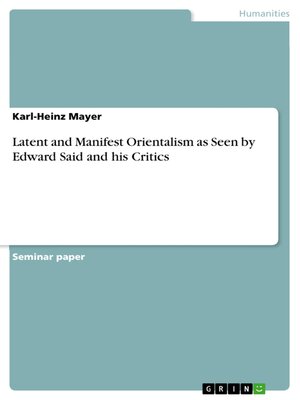
Sign up to save your library
With an OverDrive account, you can save your favorite libraries for at-a-glance information about availability. Find out more about OverDrive accounts.
Find this title in Libby, the library reading app by OverDrive.



Search for a digital library with this title
Title found at these libraries:
| Loading... |
Seminar paper from the year 2012 in the subject Philosophy - Philosophy Beyond Occidental Tradition, grade: 1.0, University of Vienna (Institut für Philosophie), course: Seminar Texte zur postkolonialen Theorie, language: English, abstract: Edward Said (1935-2003) has been widely praised as a leading thinker of post-colonialism
and even as one of its founding figures. Moreover, he "became one of the most widely known,
and controversial, intellectuals in the world during his lifetime" (Ashcroft 2009, 1). His best
known book, Orientalism (1978), is a milestone in post-colonial theory and was one of the
first examples for combining French critical theory with Anglophone cultural and textual
tradition (cf. Castro Varela 2005, 31). It actually paved the way for differentiating critical
Postcolonial Studies from the earlier Commonwealth Literary Studies with their uncritical
continuation of colonial prejudices (cf. ibid, 23). Even Daniel Varisco (2007), who argues for
a rather critical view of Said's work, concedes that "Said's book stimulated a necessary and
valuable debate among scholars who study the Middle East, Islam, and colonial history."
(Varisco 2007, XII).
Since a 10-page term paper could never do justice to a literary and scientific masterpiece like
Orientalism, this paper picks out just a small detail of its rich content: In the third and last
chapter of Orientalism, Said introduces a distinction between two forms of Orientalism,
latent and manifest. The meaning of this dichotomy does not reveal its full significance at
first reading. What exactly did Said have in mind by using this terminology – perhaps
unconsciously in addition to what he writes about it on some 20 pages of his book?
Several scholars have commented on this distinction and its significance for Said's work. This
paper will build on that material and attempt to analyze and summarize what can be found
out about the dichotomy. Particular interest will be devoted to the philosophical roots Said
was referring to when writing about latent and manifest Orientalism.
Was he influenced by Arab Philosophy in using the dichotomy?
Did he use the terms in the psychoanalytical sense introduced by Sigmund Freud and
also used by Jacques Lacan?
How do some of Said's critics, like Maria do Mar Castro Varela, Daniel Martin Varisco
or John McLeod interpret and evaluate the distinction?






